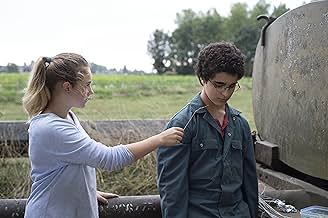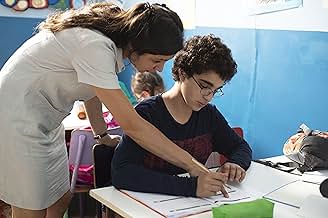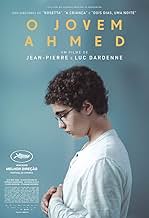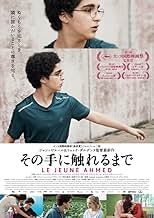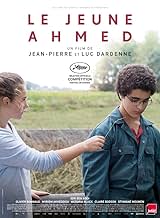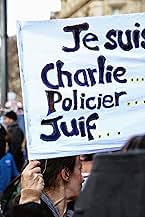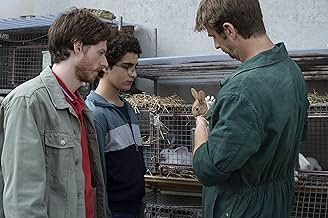Le jeune Ahmed
- 2019
- 1 घं 25 मि
IMDb रेटिंग
6.6/10
4.9 हज़ार
आपकी रेटिंग
बेल्जियम का एक किशोर कुरान की चरमपंथी व्याख्या को अपनाने के बाद अपने शिक्षक को मारने की साजिश रचता है.बेल्जियम का एक किशोर कुरान की चरमपंथी व्याख्या को अपनाने के बाद अपने शिक्षक को मारने की साजिश रचता है.बेल्जियम का एक किशोर कुरान की चरमपंथी व्याख्या को अपनाने के बाद अपने शिक्षक को मारने की साजिश रचता है.
- निर्देशक
- लेखक
- स्टार
- पुरस्कार
- 5 जीत और कुल 12 नामांकन
Eva Zingaro
- Psychologue du centre
- (as Eva Zingaro-Meyer)
फ़ीचर्ड समीक्षाएं
The Dardenne brothers linger, during 80 minutes, to a subject as cleaving as delicate: obscurantism and radicalization. Although the atmosphere is neat, the psychology of the characters is not elaborate enough. Thus, the character of Ahmed interpreted by Idir Ben Addi is definitely not credible: he looks like a harmless kid with a baby face. I can not believe such a child might fool adults so easily. As a matter of fact, the film is essentially based on this character who may then be considered as the keystone of a cinematographic structure. This keystone being defective, the structure collapses! Moreover, the rhythm of the film is a bit sluggish, even if this feeling is possibly due to my global lack of interest for the movie. In short: disappointing! 4/5 of 10.
Summary
In the current context of the resurgence of neo-fascism and with a World Cup about to be held in a misogynistic and homophobic Islamic theocracy, it is opportune to see the 2018 film in which the Dardenne brothers bravely tackled Muslim youth fundamentalism, establishing a successful cross between the psychology of the solitary leading character, the context in which he moves and certain precepts of Islam, without this being relativized or blurred.
The women act as disturbers, opponents and challengers of Islam's religious and macho misogyny embodied in the impenetrable, resolute, fanatical and tenacious teenager Ahmed, a young out-of-place radical for whom violence ends up being as natural as it is inevitable.
Review
The film follows Ahmed, a Muslim teenager from a Belgian village, who does not hesitate to resort to violence based on his interpretation of the imam's teachings on him and the Koran.
This time the Dardenne brothers face a thorny issue, and they do it frankly and without fear. I say without fear because they do not fear that by addressing the issue of Islamic fundamentalism they will be branded as Islamophobes.
The film rightly establishes a cross between the psychology of the character, the context in which he moves and certain precepts of Islam, but without this being relativized or blurred by the former. They are three dimensions that enhance each other.
There is an inevitable clash (and some irony) between the secularism of the Belgian public school and the objections of some Muslim parents who oppose for religious reasons the proposals of Ahmed's teacher of Arab origin.
An important aspect that went unnoticed by the critics is the centrality in the history of women as threats, opponents and challengers of Islam's religious and sexist misogyny, as representatives of evil that must be avoided, combated and even eliminated. It is the female figures (the mother, the sister, his teacher Inés and another that I will not reveal) who assume the destabilizing role of an Ahmed who combines his fear of female contact with a religious precept that demonizes him, while the Imam Youssuf assumes the role of the absent father, guarantor of the rules, whose teachings the young man combines with those of a religious leader who follows the web.
Another interesting aspect is that The Young Ahmed does not follow the process of religious radicalization of the adolescent, but rather the character is already approached with such a degree of fanaticism that it only remains for him to take him to the field of a violence that is as natural as it is inevitable for him. On the other hand, he is illustrative of how the system faces and seeks to redirect these situations, emphasizing respect and containment.
The Dardenne resort to their usual dry tone, with handheld camera moments that reinforce a realism supported by the presence of actors unknown to the general public. Idir Ben Addi assumes the difficult and at times unpleasant role of an impenetrable, determined, fanatical and tenacious adolescent, with an opacity that sustains an unpredictability that adds elements of a thriller to the psychological and social drama, in a story that is even more disturbing to present to us. To an unincorporated fundamentalist who acts completely on his own.
In the current context of the resurgence of neo-fascism and with a World Cup about to be held in a misogynistic and homophobic Islamic theocracy, it is opportune to see the 2018 film in which the Dardenne brothers bravely tackled Muslim youth fundamentalism, establishing a successful cross between the psychology of the solitary leading character, the context in which he moves and certain precepts of Islam, without this being relativized or blurred.
The women act as disturbers, opponents and challengers of Islam's religious and macho misogyny embodied in the impenetrable, resolute, fanatical and tenacious teenager Ahmed, a young out-of-place radical for whom violence ends up being as natural as it is inevitable.
Review
The film follows Ahmed, a Muslim teenager from a Belgian village, who does not hesitate to resort to violence based on his interpretation of the imam's teachings on him and the Koran.
This time the Dardenne brothers face a thorny issue, and they do it frankly and without fear. I say without fear because they do not fear that by addressing the issue of Islamic fundamentalism they will be branded as Islamophobes.
The film rightly establishes a cross between the psychology of the character, the context in which he moves and certain precepts of Islam, but without this being relativized or blurred by the former. They are three dimensions that enhance each other.
There is an inevitable clash (and some irony) between the secularism of the Belgian public school and the objections of some Muslim parents who oppose for religious reasons the proposals of Ahmed's teacher of Arab origin.
An important aspect that went unnoticed by the critics is the centrality in the history of women as threats, opponents and challengers of Islam's religious and sexist misogyny, as representatives of evil that must be avoided, combated and even eliminated. It is the female figures (the mother, the sister, his teacher Inés and another that I will not reveal) who assume the destabilizing role of an Ahmed who combines his fear of female contact with a religious precept that demonizes him, while the Imam Youssuf assumes the role of the absent father, guarantor of the rules, whose teachings the young man combines with those of a religious leader who follows the web.
Another interesting aspect is that The Young Ahmed does not follow the process of religious radicalization of the adolescent, but rather the character is already approached with such a degree of fanaticism that it only remains for him to take him to the field of a violence that is as natural as it is inevitable for him. On the other hand, he is illustrative of how the system faces and seeks to redirect these situations, emphasizing respect and containment.
The Dardenne resort to their usual dry tone, with handheld camera moments that reinforce a realism supported by the presence of actors unknown to the general public. Idir Ben Addi assumes the difficult and at times unpleasant role of an impenetrable, determined, fanatical and tenacious adolescent, with an opacity that sustains an unpredictability that adds elements of a thriller to the psychological and social drama, in a story that is even more disturbing to present to us. To an unincorporated fundamentalist who acts completely on his own.
While the main character could have a used a bit more character development, once we know his goal and his different attempts the suspense becomes riveting.
Knowing quite well the events in France and Belgium of the past year I'd say that the film is a strong realistic representation of fanatism in a miniature setting.
Knowing quite well the events in France and Belgium of the past year I'd say that the film is a strong realistic representation of fanatism in a miniature setting.
Over the last twenty years, the Dardenne brothers' ("The Unknown Girl") social realist dramas about the forgotten and the marginalized have been honored at the Cannes Film Festival with two Palme d'Ors, two Best Performance awards, one Best Screenplay award, and one Grand Prix. Their magic is still in evidence in their latest film, Young Ahmed, which won them the award for Best Director this year at Cannes. While it is a small film on a very big subject - that of Islamic fundamentalism - the film manages to deliver a thought-provoking and involving experience in spite of its 84-minute length and the broad scope of its subject.
Set in a small town in Belgium, a country that has endured recent terrorist attacks, the film belongs to first-time actor Idir Ben Addi who delivers a remarkable performance as Ahmed, a studious-looking, bespectacled 13-year-old boy whose hangdog appearance and inarticulateness masks his devotion to a fundamentalist religious philosophy that takes no prisoners. With his youth and malleability, his growing adherence to what he considers to be a true Muslim is fostered by his relationship with a local imam, Youssouf (Othmane Moumen, "Bad Buzz") who rails at what he considers to be the growing secular attack on Islam.
Without a father in the home to guide him, Ahmed personifies those whose obsession with ideology blinds them to their own humanity and that of others, taking on the imam's "us versus them" attitude even when it comes to his family. He calls his sister a "slut" because of the casual way she dresses and berates his mother (Claire Bodson, "Our Children") for drinking wine and not wearing a hijab. Apparently, Ahmed's transformation is recent since his mother laments the fact that just last year all he thought about were video games, but we do not know what triggered Ahmed's transformation and the film does not pursue it.
We do know, however, that he is burdened by the memory of his cousin who apparently took his own life as a suicide bomber, a fact that the imam will not let him forget. The teenager's main source of conflict is with his teacher Inès (Myriem Akheddiou, "The Kid with a Bike"). He refuses to shake her hand because he thinks women are impure and because she is dating a person of the Jewish faith. He is also upset about her plans to use music to teach Arabic and the Quran, plans that he considers sacrilegious. Labeled by the imam as an apostate, the impressionable teenager tries to prove his faith by physically assaulting her, an action for which he is placed in juvenile custody. Even this is too much for the imam who tells Ahmed that he said to oppose her beliefs, not try to kill her.
At the juvenile facility, Ahmed is treated with respect by his caseworker, psychologist, and teachers, but the viewer is left probing for clues as to whether Ahmed regrets his actions and is willing to change or whether he is quietly planning another assault. As part of his rehabilitation, he is sent to a farm where he is befriended by Louise (Victoria Bluck), the young daughter at the farm, but even her kiss does not awaken in him a feeling for people who have a different outlook on life. While Young Ahmed centers on the fundamentalist tenets of one religion, the film is not an attack on Islam but an assertion that any idea which considers itself to be the only true belief is antithetical to long-established ideals of tolerance and religious freedom.
Ultimately, no words or actions of others seem to reach Ahmed. As director Jean-Pierre Dardenne put it, "Fanatics don't listen to the outside world; they build a wall between themselves and the world. Their only goal is for others to become like them, no matter the cost." Though the direction in which Ahmed is headed is unclear, it is in the moment when his body deserts him that we get a hint he knows that his only escape from the bondage of ideology is to discover the true nature of his own being and that his only loss will be that which has stood in the way of his deeper understanding of the world.
Set in a small town in Belgium, a country that has endured recent terrorist attacks, the film belongs to first-time actor Idir Ben Addi who delivers a remarkable performance as Ahmed, a studious-looking, bespectacled 13-year-old boy whose hangdog appearance and inarticulateness masks his devotion to a fundamentalist religious philosophy that takes no prisoners. With his youth and malleability, his growing adherence to what he considers to be a true Muslim is fostered by his relationship with a local imam, Youssouf (Othmane Moumen, "Bad Buzz") who rails at what he considers to be the growing secular attack on Islam.
Without a father in the home to guide him, Ahmed personifies those whose obsession with ideology blinds them to their own humanity and that of others, taking on the imam's "us versus them" attitude even when it comes to his family. He calls his sister a "slut" because of the casual way she dresses and berates his mother (Claire Bodson, "Our Children") for drinking wine and not wearing a hijab. Apparently, Ahmed's transformation is recent since his mother laments the fact that just last year all he thought about were video games, but we do not know what triggered Ahmed's transformation and the film does not pursue it.
We do know, however, that he is burdened by the memory of his cousin who apparently took his own life as a suicide bomber, a fact that the imam will not let him forget. The teenager's main source of conflict is with his teacher Inès (Myriem Akheddiou, "The Kid with a Bike"). He refuses to shake her hand because he thinks women are impure and because she is dating a person of the Jewish faith. He is also upset about her plans to use music to teach Arabic and the Quran, plans that he considers sacrilegious. Labeled by the imam as an apostate, the impressionable teenager tries to prove his faith by physically assaulting her, an action for which he is placed in juvenile custody. Even this is too much for the imam who tells Ahmed that he said to oppose her beliefs, not try to kill her.
At the juvenile facility, Ahmed is treated with respect by his caseworker, psychologist, and teachers, but the viewer is left probing for clues as to whether Ahmed regrets his actions and is willing to change or whether he is quietly planning another assault. As part of his rehabilitation, he is sent to a farm where he is befriended by Louise (Victoria Bluck), the young daughter at the farm, but even her kiss does not awaken in him a feeling for people who have a different outlook on life. While Young Ahmed centers on the fundamentalist tenets of one religion, the film is not an attack on Islam but an assertion that any idea which considers itself to be the only true belief is antithetical to long-established ideals of tolerance and religious freedom.
Ultimately, no words or actions of others seem to reach Ahmed. As director Jean-Pierre Dardenne put it, "Fanatics don't listen to the outside world; they build a wall between themselves and the world. Their only goal is for others to become like them, no matter the cost." Though the direction in which Ahmed is headed is unclear, it is in the moment when his body deserts him that we get a hint he knows that his only escape from the bondage of ideology is to discover the true nature of his own being and that his only loss will be that which has stood in the way of his deeper understanding of the world.
The Dardenne brothers have once again produced a film that is both simple and powerful.
As the title suggests, this is the story of young Ahmed, a pre-teen who becomes totally involved in Islamism under the influence of an imam who recruits people to kill those who don't think like the Islamists. The film is interesting because it shows how the imam goes about indoctrinating him. The film is interesting because it shows how the imam goes about indoctrinating him, which will disturb, interrogate and question those around him: his school teacher, his family.
The great quality of the film is its script and staging: the story is told through the staging and what we see, i.e. Not through dialogues, intertitles or voice-overs, but through the behavior of the characters, particularly the young man. It's an impressive feat of realism and simplicity, giving every second of the film a sense of tension, a seemingly inescapable race to the finish. As the viewer is constantly from the young man's point of view, but not in his head, he discovers and understands what he is doing with a slight delay. And of course, the Dardennes exclude music from the staging: the film contains none. There's no bias to make us understand or dramatize what we're watching. A kind of empirical method.
Simple, powerful cinema. Prix de la Mise en Scène at the 2019 Cannes Film Festival. It seems obvious.
As the title suggests, this is the story of young Ahmed, a pre-teen who becomes totally involved in Islamism under the influence of an imam who recruits people to kill those who don't think like the Islamists. The film is interesting because it shows how the imam goes about indoctrinating him. The film is interesting because it shows how the imam goes about indoctrinating him, which will disturb, interrogate and question those around him: his school teacher, his family.
The great quality of the film is its script and staging: the story is told through the staging and what we see, i.e. Not through dialogues, intertitles or voice-overs, but through the behavior of the characters, particularly the young man. It's an impressive feat of realism and simplicity, giving every second of the film a sense of tension, a seemingly inescapable race to the finish. As the viewer is constantly from the young man's point of view, but not in his head, he discovers and understands what he is doing with a slight delay. And of course, the Dardennes exclude music from the staging: the film contains none. There's no bias to make us understand or dramatize what we're watching. A kind of empirical method.
Simple, powerful cinema. Prix de la Mise en Scène at the 2019 Cannes Film Festival. It seems obvious.
क्या आपको पता है
- ट्रिवियाThis movie was selected to compete for the Palme d'Or at the 2019 Cannes Film Festival, where it eventually won the Best Director Award, marking the first time the award was officially shared by a directing duo winning for a single film (although Joel Coen has won the award three times for movies he co-directed with his brother Ethan Coen where Ethan had to go uncredited per DGA rules).
- साउंडट्रैकDelay
Performed by Intergalactic Lovers
टॉप पसंद
रेटिंग देने के लिए साइन-इन करें और वैयक्तिकृत सुझावों के लिए वॉचलिस्ट करें
- How long is Young Ahmed?Alexa द्वारा संचालित
विवरण
- रिलीज़ की तारीख़
- कंट्री ऑफ़ ओरिजिन
- आधिकारिक साइट
- भाषाएं
- इस रूप में भी जाना जाता है
- Le Jeune Ahmed
- फ़िल्माने की जगहें
- Rue Chapuis 37, Seraing, Liège, Wallonia, बेल्जियम(Graines de Génie tutoring school)
- उत्पादन कंपनियां
- IMDbPro पर और कंपनी क्रेडिट देखें
बॉक्स ऑफ़िस
- US और कनाडा में सकल
- $21,291
- US और कनाडा में पहले सप्ताह में कुल कमाई
- $4,216
- 23 फ़र॰ 2020
- दुनिया भर में सकल
- $15,22,606
- चलने की अवधि1 घंटा 25 मिनट
- रंग
- पक्ष अनुपात
- 1.85 : 1
इस पेज में योगदान दें
किसी बदलाव का सुझाव दें या अनुपलब्ध कॉन्टेंट जोड़ें


![Bande-annonce [OV] देखें](https://m.media-amazon.com/images/M/MV5BM2RiNjYyN2MtNTdhOC00MmQxLWIwYmItNzE1YjkyMjkxYTk0XkEyXkFqcGdeQXRyYW5zY29kZS13b3JrZmxvdw@@._V1_QL75_UX500_CR0)

